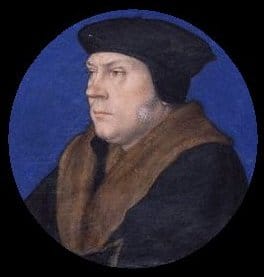 At 3pm on 10th June 1540, the Captain of the Guard strode into the council chamber at Westminster, interrupting a meeting of the Privy Council, and announced that he had a royal warrant for the arrest of Thomas Cromwell, Earl of Essex, on a charge of treason.
At 3pm on 10th June 1540, the Captain of the Guard strode into the council chamber at Westminster, interrupting a meeting of the Privy Council, and announced that he had a royal warrant for the arrest of Thomas Cromwell, Earl of Essex, on a charge of treason.
Charles de Marillac, the French ambassador, described the arrest in a letter to Anne, duc de Montmorency:
“As soon as the Captain of the Guard declared his charge to make him prisoner, Cromwell in a rage cast his bonnet on the ground, saying to the duke of Norfolk and others of the Privy Council assembled there that this was the reward of his services, and that he appealed to their consciences as to whether he was a traitor; but since he was treated thus he renounced all pardon, as he had never thought to have offended, and only asked the King not to make him languish long. Thereupon some said he was a traitor, others that he should be judged according to the laws he had made, which were so sanguinary that often words spoken inadvertently with good intention had been constituted high treason. The duke of Norfolk having reproached him with some “villennyes” done by him, snatched off the order of St. George which he bore on his neck, and the Admiral, to show himself as great an enemy in adversity as he had been thought a friend in prosperity, untied the Garter. Then, by a door which opens upon the water, he was put in a boat and taken to the Tower without the people of this town suspecting it until they saw all the King’s archers under Mr. Cheyney at the door of the prisoner’s house, where they made an inventory of his goods, which were not of such value as people thought, although too much for a “compaignon de telle estoffe.” The money was 7,000l. st., equal to 28,000 crs., and the silver plate, including crosses, chalices, and other spoils of the Church might be as much more. These movables were before night taken to the King’s treasury—a sign that they will not be restored.”
The Spanish Chronicle tells a slightly different story, but there are similarities. In its account, Thomas Cromwell’s cap blows off as the council are going to dinner and although, apparently, the custom was for others present to doff their caps if a gentleman lost his, they did not. Cromwell commented “A high wind indeed must it have been to blow my bonnet off and keep all yours on”, but they ignored him. Then, after dinner when they went to the council chamber and Cromwell was just about to sit down, Norfolk said to him, “do not sit there; that is no place for thee. Traitors do not sit amongst gentlemen.” When Cromwell denied that he was a traitor and asked to see the King, he was arrested. As he was escorted out of the chamber, the Duke of Norfolk cried “Stop, captain; traitors must not wear the Garter,” and tore it off him.
Thomas Cromwell was executed on 28th July 1540, following the passing of a bill of attainder against him on the 29th June 1540 for the crimes of corruption, heresy and treason. In March 1541, Marillac recorded that Henry VIII sometimes reproached his ministers for Cromwell’s death, saying “by false accusations, they made him put to death the most faithful servant he ever had.”
On this day in history…
- 1537 – Deaths of Blessed Thomas Green and Blessed Walter Pierson, Carthusian monks from London Charterhouse, in Newgate Prison, from starvation. They were two out of nine monks who were purposely starved to death for refusing to accept the royal supremacy. Others were hanged, drawn and quartered.
Notes and Sources
- LP xv. 804
- Chronicle of King Henry VIII. of England: Being a Contemporary Record of Some of the Principal Events of the Reigns of Henry VIII and Edward VI (The Spanish Chronicle), p98-99
- LP xvi. 590